We had decided to join all the Greek families who had come out dressed to the nines in their Sunday best to celebrate and watch the youths parade that was taking place in Asprovalta. On this day in early spring parades are held throughout the country, and we had briefly considered going to Serres or even to Thessaloniki to watch. Our eldest son had wondered whether we’d like to come and watch with him the parade on the beautiful new promenade along Thessaloniki’s seafront. We briefly toyed with the idea but then discarded it simply because neither of us is particularly fond of crowds or busy roads, and we knew from many years experience that on this day the cities as well as larger towns would be absolutely packed. We felt it would be more practical and convenient to stay in the local area; not too crowded, ample parking space and I would have a much better chance at composing a decent photographic account of what these celebrations all entailed.
In fact, talking photographs here, when we had a major power cut last Wednesday, two days before the actual Parade Day, we decided to make it a day out and go to the WiFi cafe in Vrasna which neighbours Asprovalta, only to find that they too were the victim of “no electricity” (new pylons were being installed in the area!). What had started as a-day-gone-wrong actually turned out to be a blessing in disguise. As we moved onto the beach road that leads into Vrasna, we saw dozens of youngsters and children milling around in groups on the road. I told hubs I thought they were actually there for the dress rehearsal of Friday’s Parade.... As it turned out, I was right. And so, I’m probably one of the few people in Greece who has ever recorded the rehearsal of the parade...! Lucky us -what a fun-packed experience that was... as you can see from the pictures!
(just hover your cursor over the image below and click Play to start the picture stream)
We’d agreed to make it an entire day out in view of the fact that the weather gods were smiling upon us here and had been spoiling us with unadulterated sunshine for the last couple of days! The first really warm sunny days of the year! We’d called Kostas, our friendly baker, in advance and asked him whether he could prepare our vegan leek and spinach pies by 9:30am so that we could pick those up early and then have a picnic somewhere by the sea later during the early afternoon. That way neither of us would have to stand in the kitchen to cater for our lunch requirements – not that we mind doing so, but it was a holiday after all, and a little treat is always much appreciated!
Before relaying the account of the day, I’d like to give you some background information on what 25th March is all about.
 Bishop Germanos of old Patras blessing the Greek banner
Bishop Germanos of old Patras blessing the Greek banner The uprising that ensued after the Forty Brave “Palikaria” took on the Turkish settlement in Tripolis lasted for eight years, until 1829, when the then Sultan, Mahmud the Second, who was facing Russian troops at the gates of Constantinople, could do little more than accept the Greek independence. This Independence was sealed by the Treaty of Adrianople.
I had in fact prepared a paper with some information, but while browsing online to see if I could find a more “narrated” story I came across the following article, written by John Kass, which featured in the online version of the Chicago Tribune. After reading it, I thought there was no way I could have explained things as well as he did and that’s why I’m sharing it here with you:
+++
The old song, one of my favorites, doesn't have to tell you it was cold in the mountains of Greece in early spring, when those 40 brave young men, the 40 Palikaria from Levadia, were walking.
Levadia is a small town in central Greece, not far from the Oracle of Delphi. The 40 Palikaria had a march of several days ahead of them.
It was a death march, of sorts. They were walking south to the Ottoman Turks' fortress stronghold of Tripolis, which is near my own family's village of Rizes.
(Note: these are translated lines from the much-loved Greek folklore song Ta Saranda Palikaria, 40 Brave Youths)
They met an old man. An old man on the road.
Bless you 'yero'! Bless you old man!
He answered them, 'Welcome, my young braves!
Where are you going? Brave youths, where do you go?'
We go to trample on great Tripolitsa! Come with us!
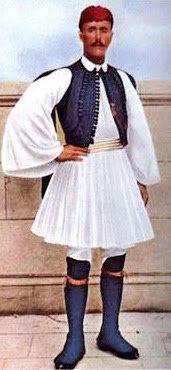 the traditional foustanella
the traditional foustanella It was March 25, 1821.
...
And today, March 25, is Greek Independence Day.
If you know someone who is Greek or of Greek descent, someone with strong ties to the old country you might ask about the song of the 40 Palikaria from Levadia. Phonetically, you'd call it "Saranda Palikaria" (Sah-RAN-da Pa-lee-KAR-ia), The 40 Brave Youths. And when you ask about the Saranda Palikaria, watch for their reaction.
Greek Independence Day isn't a day of great profit for the beer companies. The politicians pay homage to it — they want those campaign checks coming — but it isn't a major holiday in America. You won't feel as if you've sinned if you don't wear blue.
There are a few versions of "Saranda Palikaria." It is a song of pride, a song that hints at pain to come. I'm sorry I can't sing it for you, but I can tell you that it is a song of clarinets, a mountain song best sung by harsh, guttural male voices, voices with smoke in them. And when we dance it in a circle, we dance it with our backs straight.
There's a story behind the song that's not usually shared by immigrants and the children of immigrants in a new land.
At the time of the 40 Palikaria, there were atrocities on all sides. As I write this, I want you to know that I feel no animosity toward the Turkish people of today. But either you tell a story or you don't, and today is March 25, the day that this story should be told.
The fight back then was between neighbors, although one neighbor was dominant, the powerful Muslim neighbor holding his hand out to the subservient Christian for the hand to be kissed.
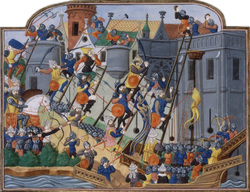 Siege of Constantinople, by Jean Chartier
Siege of Constantinople, by Jean Chartier It began in 1453 with the fall of Constantinople, when the Turkish sultan rode his horse into the great church of Christendom, Agia Sophia. He rode his horse right up onto the altar, to demonstrate how things would be from then on.
The relationship stretched four centuries, with generations upon generations of human beings becoming used to each other's rhythms and rituals and holidays and feasts. And then they took out the knives.
Then, like now, March is still a cold month in Greece and the mountain rivers were swollen. The roads were wet as the brave youths walked south into the Peloponnesus.
In every village on March 25, there was much activity. The Greek Orthodox churches would have just completed the morning liturgies celebrating the Annunciation of the Virgin Mary, the day upon which she is told by the angels of the child she will bear.
The sultan let the Greeks pray in their churches, but the Ottomans didn't let the Greeks go to school. The sultan knew that the best way to control them was to keep them illiterate. So the Greeks went to school at night, sneaking along mountain paths to find school in mountain caves, to be taught by the priests to read and write.
Control was manifested in other ways. If a Greek woman was groped or worse by a Turkish soldier, her relatives had no choice but to thank him for the compliment or be still.
Another way to keep control was to take the firstborn son of each Greek family and raise it in the sultan's army. These firstborn Greeks were enrolled in the sultan's elite special forces, the Janissaries, and they were used to hammer their own people.
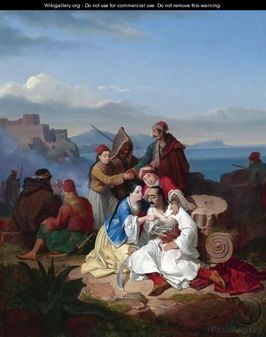
But after 400 years, that control was finally breaking.
As the 40 Palikaria were walking on the road, the people of the land were in prayer, but they were also reaching for their knives.
Come with us old man!
Brave youths, I'm too old.
But take my youngest son.
He'll take my place.
He can run like a rabbit.
He can soar like a partridge.
These weren't merely abstract or mythic figures in paintings and song. For many of us, they were our great-great-grandfathers, our blood.
And today is the day we remember and honor them.
(John Kass) (Chicago Tribune – online version)
And thus it came that on this glorious sunny 25th of March 2011 hubs and I were standing among all those people who’d come to watch their own children, or friends’ children, march along the beach road in Asprovalta, joined by anyone with name or rank within the hierarchy of local officialdom and church representatives to commemorate together one of the two most special days of Greek national celebrations.
Standing there, soaking it all in through the eye of the lens, I can only add that it was quite a moving experience to see those happy, smiling faces of the children, many of whom were dressed in traditional costumes, and their proud parents beaming and clapping as their offspring paraded past them.
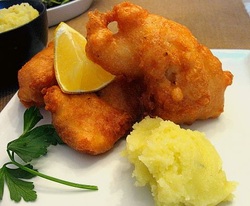 Bakaliaros me skordalia ... (photo downloaded)
Bakaliaros me skordalia ... (photo downloaded) Less than an hour after the first people started showing up on the empty beach road, the show was over... and calm and normality returned. The local tavernas and cafes would be full with people happily chatting and rejoicing in the good weather - it had been a good parade, and it was now time to enjoy one another's company and dig into some tasty traditional 25th of March food: fried cod with garlic mashed potatoes - locally known as Bakaliaros Skordalia...
Allas!... not for us... we had our vegan pies to look forward to...
Reflecting back on Friday, I can truly say that it had been a day when the Greek flags were being waved with pride throughout the country, and before signing off for today, one last bit of information: Did you know that the Greek flag, the "Galanolefki" has in fact not changed since that uprise against Ottoman rule in 1821? We for one didn’t know. The colour of the flag is cerulean blue with white stripes and a white cross in the upper left hand corner, roughly covering a quarter of its size. The cross represents the role of the Greek Orthodox Church in the formation of the Hellenic Nation. The blue and white stripes are a link to the sea - the relentless waves of the Aegean - with white standing for peace and honesty as well as the white colour of the foam on the waves in the sea, while the blue symbolizes vigilance, truth and loyalty, perseverance and justice, and the deep blue of the Greek sea. Legend has it that Aphrodite, the mythological goddess of beauty emerged from those waves. The nine stripes of the flag symbolize the 9 syllables of the phrase "Freedom or Death" - "Eleutheria H Thanatos" (E-lef-the-ri-a i Tha-na-tos). This was the motto used during the years of the Hellenic Revolution against the Ottoman Empire.
Bottom line, that is what 25 March is all about – the struggle of a nation to retain its most prized possession: its Freedom and national identity.
I think the pictures hereafter will tell you more about our day than I could possibly add with mere words...
Enjoy and perhaps reflect on the fact that history more often than not has gruesome tales to remind us of what we are today... in theory they should serve as a lesson!
Xronia polla, Ellada! May your gods be kind to you...
From me, as always
With smiles,
Emm xx
(just hover your cursor over the image below and click Play to start the picture stream)
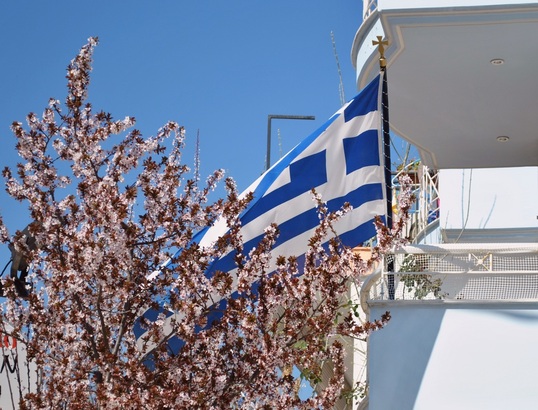

 RSS Feed
RSS Feed
